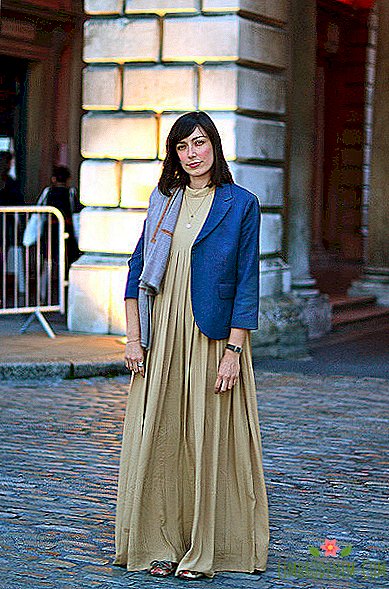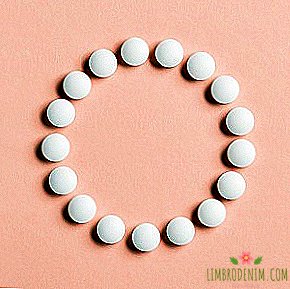"My world has lost its smell": How I live without smelling
We used to perceive the world multisensory - to make a complete picture, relying on the data of the senses. People with visual or hearing impairments are immediately recorded by society in the category of “people with disabilities”. At the same time, most of us hardly imagine that limitations can arise in the other three senses, and even more so, how this changes the picture of the human world. I live without smell for about ten years. This feature has its drawbacks, but there are also advantages. And the main thing is a part of me.

How it all began
As a child, I felt smells quite normal, but never gave them much importance. The smell was just an attribute of the object, like color or texture: here the apple is green, smooth and elastic and smells like apple. Mom's sense of smell was developed much stronger, and she often suffered from this. The person who smoked was called nothing more than “smoked”, informing that from all his things “unbearably smashed” with tobacco. A man in a stale T-shirt could get an epithet of "medieval" behind his eyes. Little, I imagined that the scent was my mother's superpowers, but I did not regret that I did not inherit her.
Everything went on as usual until the end of the school. I have always been nervous, easily stressed. And then the eleventh grade, preparation for exams, control and Olympiads - all who graduated from school, faced with a hassle. I was not just worried, but was on pins and needles: we turned out to be the first graduation, which was to enter higher education institutions only as a result of the Unified State Exam, information about exams constantly changed. Since I aimed at Moscow State University, I had to prepare twice as hard.
I remember I bought a box of dry perfume with an unobtrusive floral scent as a small gift to myself before the New Year. I was not even attracted to the fragrance, but a pretty tin, in which there was an ointment, but the smell was remembered. It was the last authentic memory of how I sniff something.
One day in March, at school, there was a strong smell of hydrogen sulfide — someone's bad experience in a chemistry class. Classmates crooked and pinched noses. And I did not feel anything. Then for the first time I clearly realized that there was no sense of smell. I can not say exactly at what point in the interval from January to March, I lost my sense of smell. Just as I do not remember whether it happened instantly or gradually. I had no injuries, no incidents that could affect the sense of smell or the condition of the nasopharynx. Just the world lost its smell.
The reasons
That spring, I didn’t worry much about what was going on with my body: graduation from school and entering university was more important. My mother became more nervous: under her pressure, I went to an otolaryngologist. The doctor, not really examining me, concluded that I somehow damaged the nasal mucosa and receptors and after six months everything should return to normal. But the “normal” organism did not come in six months, or a year or two. I completely immersed myself in my studies and student life, settled in a dormitory, acquired new acquaintances and friends. My mother's efforts to lure me to the examinations were fended off - she only gave up to persuasion only at senior courses.
I studied at the Faculty of Biology. When we began to study human physiology, after one of the lectures on the senses, I decided to ask the professor about the possible reasons for the long absence of smell. Among the most obvious ones, our teacher named polyps — benign tissue growths that can physically pinch the olfactory nerve and block its signal. Polyps are easy to operate on, so I decided to once again walk around the doctors.
Mom made me go through a comprehensive diagnosis - from encephalograms to MRI of the head. It turns out that she tried to look for information about similar cases, but, as often happens, she found many horror stories about parasites in the brain, tumors and necrosis. Attempts to explain from a scientific point of view why I could not have any of the above, did not give a result. We spent a lot of time, money and effort to finally reassure parents: I did not have any polyps or cancer, the hordes of larvae did not attack the brain, everything in my head functioned normally. Besides the fact that I still did not smell.
I lost track of the doctors I came to in trying to find out the reasons. None of them could give an exact answer. A plausible version was obtained only by the therapist, to whom I came up with a completely different problem. If there is no organic damage, he said, then it could be a psychological blockage - the brain simply does not give out information about the incoming olfactory signal. If the feature does not interfere with living, then it is not necessary to correct it, he added. This put an end to my medical throwing.

Superpowers and fears
The first year was a funny episode. The teacher of chemistry, having learned that I have no sense of smell, did not believe it - they say, this does not happen. He took the flask from the shelf, opened the cork and put the neck right under my nose. I, of course, did not feel anything and shrugged. The professor was so impressed that he gave me a credit for the laboratory work with an automatic machine - there was a concentrated liquid ammonia in the flask.
There were many more cases in the university when the absence of smell helped me out. Still, biology is a rather “stinking” specialty: strong fixatives, specific environments, living (and not so much) material. I was proud that I can help classmates with the most foul-smelling (in the literal sense of the word) affairs. My feature did not cause any ridicule, and even heightened interest among them. For this, I am very grateful to them: I encountered the tactless and boorish behavior much later and was better prepared for it. In general, it seems to me that there is more benefit from insensitivity to smells than harm. My friend tells me that he envies nine times out of ten: according to him, the world around us mostly smells unpleasant. Therefore, I call the absence of smell not a defect or disease, but a feature.
Fears, however, were also. The strongest is connected to the gas stove: I will not feel a gas leak if it happens. Fear of fire comes from childhood - for some reason it seemed the most terrible and irreparable that can happen in a house. Fortunately, a few years ago I moved to a new house with an electric stove, and the need to constantly ask others if it smells of gas, has disappeared.
At some point, I became very worried that if it would smell bad from me, I wouldn’t find out, and people around me would think that. It seemed that this was an important point: a person might look like anything, but he should smell nice, otherwise social censure cannot be avoided. I bought myself the most “severe” deodorant, tried to change clothes more often. Gradually, fortunately, the fear subsided - I realized that standard hygiene is enough. Sometimes I feel sad that I cannot sense, for example, the smell of a summer meadow, my favorite lily of the valley or the sea. But in general, I am accustomed to such a world as I perceive it, and rarely think about the fact that I feel it is “incomplete”.
Tips and stereotypes
Like any person with differences from the "norm", I sometimes come up with uninvited advice: everyone around them supposedly knows better what you need and try to help you compassionately. What they didn’t offer me - from "good specialists" to recipes for mumiyo ointment. Fortunately, this is mainly what older people do, and peers are much easier to relate to diversity.
Often, even friends who know me well, without hesitation, offer me, for example, fresh strawberries: "Mmm, you just smell it, how great it smells!" I do not take offense - I understand that they are not on purpose: this behavior is simply too tightly sewn into the brain. Departure from the standard scenario requires awareness and attention to the feelings of other people, this needs to be learned.
Most often, new acquaintances who learn about my features suggest that I do not even feel the taste of food. It is not so - with taste everything is in order. Maybe I feel him weaker, but only slightly, and if you believe my memories, nothing has changed. It is much more unpleasant when the interlocutor connects my thinness with the lack of smell - supposedly I have less appetite and insensitivity to the smell of food helps keep myself "in shape." To argue about the reasons for the constitution of another person in principle seems unacceptable to me, and even more so in this vein.
The second frequent assumption is that my other feelings have sharpened in order to “compensate”. It's harder for me to judge here, but I think this is also a mistake. In human evolution, the olfactory feeling has faded into the background, yielding to vision and touch, so its loss hardly requires compensation. At least, the light myopia inherited from the father has not gone away.
When I began to say more openly that I did not smell, I learned that my peculiarity was not unique. Many, as it turned out, have acquaintances who did not have a sense of smell at some period of life or who live with it all the time. It seems to me that we need to talk more about the features: only an open discussion of the fact that all people are different, will help many not to be alone with fears and misunderstandings.

Perfume and the future
I was indifferent to the perfume for a long time: first because of the young age, then because of the insensitivity to odors. Perfumery seemed to me overkill, and the consultants in the stores, pushing paper strips into each other with the words "Listen to our new fragrance", were incredibly annoying. First, why “listen” when scents smell? Secondly, I didn’t know how to react to them correctly: I never knew how to pretend, and I didn’t have the strength to explain each one to me.
When I began to be interested in fashion, I realized that fragrance is also a component of the image, like makeup and accessories. You can change every day, but you can faithfully wear the same thing for years. I wanted to supplement my image with a single perfume that would start associating with me in everyone with whom I communicate a lot. I chose according to the description, because I remembered that I used to like fresh, spicy and woody smells, and the floral and sweet ones, on the contrary, were not mine. Judging by the reaction of others, I guessed the aroma that matched me almost from the first attempt.
Surprisingly, it was the choice of perfume that shifted the matter from a dead end: I began to occasionally distinguish certain parts of the smells. Olfactory world ceased to be a vacuum for me, but became rather a white sheet, on which you can sometimes see small strokes. This suggests that perhaps that doctor was right and the sensations are simply blocked by consciousness. Then I have a hope to completely “recover” - only you have to go, not to Laura, but to a competent psychotherapist.
Images:ra2 studio - stock.adobe.com, tuk69tuk - stock.adobe.com




